Oxfam
 | |
| Named after | Oxford Committee for Famine Relief |
|---|---|
| Founded | 5 October 1942 |
| Founded at | Oxford, England |
| Type | International NGO |
| Registration no. | 202918[1] |
| Focus | Poverty eradication Disaster relief Advocacy Policy research Migration advocacy |
| Headquarters | Nairobi, Kenya |
Area served | Worldwide |
Director | Gabriela Bucher[2] |
Board of directors | Dr Jemilah Mahmood (Chair)[2] |
| Website | www |
Oxfam is a British founded confederation of 21 independent charitable organizations focusing on the alleviation of global poverty, founded in 1942 and led by Oxfam International.[3]
History
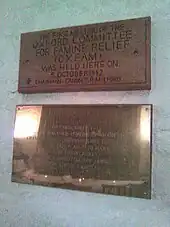
Founded at 17 Broad Street, Oxford, as the Oxford Committee for Famine Relief by a group of Quakers, social activists, and Oxford academics in 1942 and registered in accordance with UK law in 1943, the original Oxford Committee for Famine Relief was a group of concerned citizens including Henry Gillett (a prominent local Quaker), Theodore Richard Milford, Gilbert Murray and his wife Mary, Cecil Jackson-Cole and Alan Pim. The Committee met in the Old Library of University Church of St Mary the Virgin, Oxford, for the first time in 1942, and its aim was to help starving citizens of occupied Greece, a famine caused by the Axis occupation of Greece and Allied naval blockades and to persuade the British government to allow food relief through the blockade. The Oxford committee was one of several local committees formed in support of the National Famine Relief Committee.[4]
Oxfam's first paid employee was Joe Mitty, who began working at the Oxfam shop on Broad Street, Oxford on 9 November 1949. Engaged to manage the accounts and distribute donated clothing, he originated the policy of selling anything which people were willing to donate, and developed the shop into a national chain.[5]
Fundraising innovations led by advertising adviser Harold Sumption, including rigorous testing of advertising campaigns, direct mail, the trading catalogue, and the first multimedia fundraising campaign the "Hunger £ Million"[6], helped Oxfam become, for a time, the largest charity in the UK[7]. By 1960, it was an international non-governmental aid organization. The first overseas committee was founded in Canada in 1963, and in 1965 the organization changed its name to its telegraphic address, OXFAM. The Oxford committee became known as Oxfam Great Britain or Oxfam GB. In 1995 Oxfam International was formed by a group of independent non-governmental organizations. Stichting Oxfam International was registered as a non-profit foundation at The Hague, Netherlands, in 1996.[8]
Winnie Byanyima was the executive director of Oxfam International from 2013 to 2019.[9]
Oxfam's work
Focus
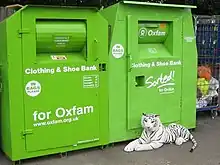
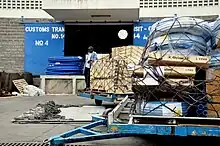
Oxfam has provided relief services during various global crises, including the Israeli–Palestinian conflict, North Korean famine, 2011 East Africa drought, 2012 Sahel drought, Nepal earthquake[10] and Yemeni crisis.[11] The Bosfam NGO was also founded in May 1995 by women participating in an Oxfam GB psycho-social 'radionice' project to support internally displaced women during the Bosnian war. Oxfam has become a globally recognized leader in providing water sanitation to impoverished and war-torn areas the world over. In 2012, Oxfam became one of the humanitarian groups that comprise the UK's Rapid Response Facility to ensure clean water in the wake of humanitarian disasters.[12]
A January 2014 Oxfam report stated that the 85 wealthiest individuals in the world have a combined wealth equal to that of the bottom 50% of the world's population, or about 3.5 billion people.[13][14][15][16][17] More recently, in January 2015, Oxfam reported that the wealthiest 1 percent will own more than half of the global wealth by 2016.[18] An Oxfam report released in 2017 stated that eight billionaires possess the same amount of wealth as the poorest half of humanity.[19][20][21][22]
Campaigns
The Make Trade Fair campaign organized by Oxfam International focuses on the elimination of trade practices, like dumping, which occurs when highly subsidized, surplus commodities from developed countries such as rice, cotton, corn, and sugar are sold at low prices and farmers from poor countries have difficulty competing.[23] Another practice Oxfams opposes is the setting of tariffs, where nations enforce high taxes on imported goods, restricting the sales of products from other nations,[24] unbalanced labour rights for women, who often earn lower wages than their male counterparts,[25] and stringent patent issues that prevent the prices of medication, software, and textbooks (e.g. gene patents, chemical patents, and software patents) from being lowered. Thus, such essential goods are often inaccessible to developing nations.[26]
Shops

Oxfam has shops all over the world, which sell many fair-trade and donated items since their first charity shop opened in 1948,[27] although trading began in 1947. The proceeds from these are used to further Oxfam's mission and relief efforts around the globe. Much of their stock comes from public donations but as of 2012 they still sold fair trade products from developing countries in Africa, Asia and South America, including handcrafts, books, music CDs and instruments, clothing, toys, food and ethnic creations. These objects are brought to the public through fair trade to help boost the quality of life of their producers and surrounding communities.[28]
As of 2010, Oxfam had over 1,200 shops worldwide.[29] More than half of them were in the UK with around 750 Oxfam GB shops including specialist shops such as books, music, furniture and bridal wear. Oxfam Germany has 45 shops including specialist book shops; Oxfam France shops sell books and fair trade products and Oxfam Hong Kong has 2 shops selling donated goods and fair trade products. Oxfam Novib, Oxfam Australia (with over 20 fair trade shops), Oxfam Ireland and Oxfam in Belgium also raise funds from shops.
Of the 750 Oxfam charity shops around the UK, around 100 are specialist bookshops or book and music shops. Oxfam is the largest retailer of second-hand books in Europe, selling around 12 million per year. In 2008, Oxfam GB worked with over 20,000 volunteers in shops across the UK, raising £17.1 million for Oxfam's programme work.[30]
Fundraising
Oxfam has several successful fundraising channels in addition to its shops. Over half a million people in the UK make a regular financial contribution to its work. In April 2017 the Information Commissioner's Office fined Oxfam charities for breaching the Data Protection Act by misusing donors' personal data. Oxfam was fined £6,000.[31]
Offices and affiliates
Oxfam international consists of 21 Affiliates and the international secretariat in Nairobi. There are additional offices in Addis Abeba, Washington, D.C., New York City, Brussels and Geneva.[32]
| Affiliates | Country | Established | Full Affiliate since |
|---|---|---|---|
| Oxfam America | 1970 | 1995 | |
| Oxfam Australia | 1954 (as Food for Peace Campaign) | 1995 | |
| Oxfam-en-Belgique/Oxfam-in-België | 1964 | 1995 | |
| Oxfam Canada | 1966 | 1995 | |
| Oxfam Columbia | 2020 | Observer | |
| Oxfam France | 1988 | 2006 | |
| Oxfam Germany | 1995 | 2003 | |
| Oxfam Great Britain | 1942 | 1995 | |
| Oxfam Hongkong | 1976 | 1995 | |
| Oxfam IBIS | 2014 (before World University Service) | 2016 | |
| Oxfam Italia | 1976 (as Ucodep) | 2012 | |
| Oxfam Intermón | 1956 (as Intermón) | 1997 | |
| Oxfam India | 2008 | 2011 | |
| Oxfam Ireland | 1971 | 1998 | |
| Oxfam Mexico | 1996 | 2008 | |
| Oxfam New Zealand | 1991 | 1995 | |
| Oxfam Novib | 1956 (as Novib) | 1995 | |
| Oxfam Québec | 1973 | 1995 | |
| Oxfam South Africa | 2013 | 2016 |
Oxfam Japan was a member from 2003 to its closure 2018.[33]
Oxfam International
.jpg.webp)
The Oxfam International Secretariat (OIS) leads, facilitates, and supports collaboration between the Oxfam affiliates. The OIS Board comprises the executive director, Chair of each Affiliate, and the OI Chair. The Affiliates' Chairs are voting members and are non-remunerated. The executive directors and the OI Chair are all non-voting-members. The Board also elects the Deputy Chair and Treasurer from among its voting members. The Board is responsible for ensuring that Oxfam International is accountable, transparent, and fit for purpose.[34] In 2009–10 it had approximately 77 staff (including secondment placements and temporary staff). It is funded by contributions from affiliate organizations and has an operating budget of US$8.7M.[35] The legal name of the entity is Stichting Oxfam International.[36]
Oxfam America
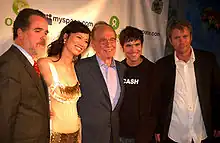
In 1970, Oxfam America became an independent nonprofit organization and an Oxfam affiliate in response to the humanitarian crisis created by the fight for independence in Bangladesh. Oxfam America's headquarters are located in Boston, Massachusetts, with a policy and campaigns office in Washington, D.C., and seven regional offices around the world. A registered 501(c)3 organization, Oxfam America campaigns for climate change adaptation, food security, aid reform, access to medicines, and fair trade. Ray Offenheiser served as the president and CEO of Oxfam America from 1996 until 2016.[37] As of 2017, the president and CEO is Abby Maxman.[38][39]
Oxfam Australia
Oxfam Australia is an independent, not-for-profit, secular, community-based aid and development organization, and an affiliate of Oxfam International.[40]
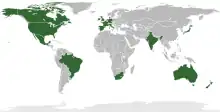
Oxfam IBIS (Denmark)
IBIS was founded as an independent organization in 1991, but has its roots in the Danish department of World University Service and has been active since the 1966 (initially mainly against apartheid and similar situations in other southern African nations).[41][42] Since the 1970s, it mainly worked with projects in Africa and Latin America, and usually focused on democracy, education and the causes of poverty.[41][43] In 2014 IBIS became an observer member of Oxfam and in October 2016 it became a full member.[43][44] Around the same time, the name was modified from IBIS to Oxfam IBIS.[42][44]
Oxfam GB (Great Britain)
Oxfam GB's headquarters are in Cowley, Oxford. The finance office is in Newcastle, from where Oxfam shops are managed.[45] Oxfam GB had a total income of £408.6m in 2016/17, had 5,000 employees, and used the services of 23,000 volunteers.[46][47] In 2016 it received £31.7m from the British government.[48] Mark Goldring was the chief executive officer from 2013 until January 2019, when he was replaced by Dr Dhananjayan (Danny) Sriskandarajah.[49][50]
Oxfam India
Oxfam's involvement in India began when money was granted in 1951 to fight famine in Bihar. Bihar at the time was one of the poorest and most populated states in India.
Oxfam had launched an appeal that led to the first report of Oxfam's work in the House of Commons in UK. On 31 May 1951, Secretary of State for Commonwealth Relations had commended the Bihar appeal, stating "the Oxford Committee for Famine Relief has made an appeal for donations and I hope individuals will reply to that generously". Among the many donations received was one for 100 British pounds from an Indian Rajah in appreciation of what Oxfam was doing for the hungry of his country.[51]
Bihar and famine would bring Oxfam back to India in 1965 to address drought due to bad monsoons. Bihar held a population of 53 million, of which 40 million relied on subsistence farming to live.[52] This would compound for India in the future; production of food had not been parallel to its exploding population. It is estimated that, over the course of the droughts and famines, 2,400 tons of milk was bought by Oxfam and at the height of this was feeding over 400,000 children and mothers.[53] In 1968 Oxfam's first field director in India, Jim Howard, created the Oxfam Gramdan Action Programme, or OGAP.[53] This was the first joint rural development programme in Oxfam and the first step to a new 'operational' Oxfam. Oxfam India was established on 1 September 2008 under section 25 of the Companies Act, 1956 as a non-profitable organization with its head office in Delhi and is now a member of Oxfam International Confederation. This was marked by Oxfam's 60th year in India.[54]
Effective from January 01, 2022, Oxfam lost its foreign-funding license registration under the Foreign Contribution Regulation Act ( FCRA) which is mandatory for charities, NGOs and any non-profit organisations receiving foreign funding in India along with 6,000 other such organisations.[55]
Oxfam New Zealand
Oxfam New Zealand[56] is an aid and development organization and affiliate of Oxfam International.[57] Oxfam NZ is also responsible for delivering Cyclone relief in several countries in the Pacific region.[58] Oxfam New Zealand's work is made possible by supporters, interns, staff, volunteers, board and overseas partners. Most of the staff are based in their Auckland office. They also have a policy unit in Wellington.[59] Most of Oxfam New Zealand's funds come from donations, supplemented by New Zealand government funds.
Criticism
Israeli–Palestinian conflict
In 2002, Oxfam Belgium published a poster inciting a boycott of Israel, with a caricature of a bloody orange. The resemblance of the bleeding orange to the antisemitic blood libel was considered blatant, notably by the Simon Wiesenthal Center. Following their complaint, Oxfam International communicated that it does not support the boycott of Israel, that it considers the poster message to have been inappropriate, that it regrets Oxfam's association with this type of message and offered an apology. Oxfam Belgium was reprimanded by the president Ian Anderson.[60][61]
In October 2009, Oxfam was accused by Israeli NGO Regavim of aiding Palestinians in illegal activities in Kiryat Arba, including water theft. Oxfam has denied its participation.[62]
Oxfam UK has partnered with the Board of Deputies who represent the Jewish community of the UK. The project, Grow-Tatzmiach, includes sending 25 people to an activist training programme to help fight global hunger. In exchange for partnering, Oxfam has agreed not to "call for a boycott of Israeli goods or to support groups that do so, and will not partner with organizations that advocate violence or oppose a two-state solution to the Israeli–Palestinian conflict". Despite this agreement, there are still those on both sides who object to this project.[63]
In response to a 2012 Oxfam report which laid the blame for poor economic development in the Palestinian territories solely with Israel, a spokesman for the Israel embassy in the UK said, "Oxfam's latest report on the situation in the Palestinian territories puts a clearly political agenda above any humanitarian concern. Far from advancing peace, such an approach undermines the prospects of reaching a negotiated resolution to the conflict."[64]
As of 2013 Oxfam endorsed the two-state solution and wants Israel to lift the blockade of the Gaza Strip and dismantle all of the Israeli settlement infrastructure.[63]
On 17 January 2014 Oxfam UK cancelled an exhibition, "Gaza: Through my Eyes", which had been due to take place at East London Mosque after Left Foot Forward presented information to the charity detailing homophobic and potentially anti-semitic comments by one of the organizers, Ibrahim Hewitt. Human rights campaigner Peter Tatchell was reported as welcoming the event's cancellation but to have said of Oxfam UK, "it is hugely disappointing that it did no proper checks on (Mr. Hewitt) before agreeing his presence."[65]
On 29 January 2014 actress Scarlett Johansson resigned as an international spokeswoman for Oxfam after appearing in a TV ad for SodaStream, a company with presence in the West Bank. Her publicist stated that Johansson "respectfully decided to end her ambassador role with Oxfam after eight years ... She and Oxfam have a fundamental difference of opinion in regards to the boycott, divestment and sanctions movement."[66]
In February 2015, Israeli NGO Regavim released a report stating that the European Union had illegally funded the construction of houses; Oxfam and other NGOs participated in the project. Oxfam defended the construction "on humanitarian grounds."
In 2019, the Israeli intelligence services implicated Oxfam Belgium, in funding the PFLP, which carried out a bomb attack the same year and killed the Jewish teenager Rina Sneirb. Oxfam Belgium transferred funds to the subsidiary in the amount of 288,002 euros from 2017 to 2018, but claims to have made no funding since.[67]
In March 2020, the ambassador of Israel in the United Kingdom, Mark Regev, protested the selling of antisemitic books on Oxfam website, notably the Protocols of the Elders of Zion. After the protest, the Oxfam GB chief executive apologized and removed the books from sale.[68]
In October 2020 NBC News reported Oxfam was on the list of human rights organizations the Trump administration was considering branding as anti-Semitic.[69]
Internal structures and political role

In October 2005, the magazine New Internationalist described Oxfam as a "Big International Non-Government Organisation (BINGO)", having a corporate-style, undemocratic internal structure, and addressing the symptoms rather than the causes of international poverty – especially by acquiescing to neoliberal economics and even taking over roles conventionally filled by national governments.[70] Similar criticism came from Red Pepper magazine in July 2005[71] and Katherine Quarmby in the New Statesman in May 2005.[72] The latter article detailed growing rifts between Oxfam and other organisations within the Make Poverty History movement.
In a 2011 Columbia Journalism Review article, journalist Karen Rothmyer accused NGOs in general and Oxfam in particular of being unduly influenced by the priorities of the media, of providing inaccurate information to the press ("stories featuring aid projects often rely on dubious numbers provided by the organisations") and of perpetuating negative stereotypes which "have the potential to influence policy". She drew on earlier work by journalist Lauren Gelfand, who had taken a year away from journalism to work for Oxfam: "A lot of what Oxfam does is to sustain Oxfam"; and Linda Polman, author of the Crisis Caravan: "Aid organisations are businesses dressed up like Mother Theresa".[73] In 2015, Omaar and de Waal, in Food and Power in Sudan, commented, "the 1990s have seen growing pressure for humanitarian institutions to become more accountable. There has been a succession of reviews of operations, growing in independence and criticism."[74] They quote an OECD report, "The Joint Evaluation of Emergency Operations in Rwanda", which stated that its team "came across examples of Agencies telling, if not falsehoods, then certainly half-truths" and noted "a remarkable lack of attempts by agencies to seek the views of beneficiaries on the assistance being provided".[75]
Conflict with Starbucks on Ethiopian coffee, 2006
On 26 October 2006, Oxfam accused Starbucks of asking the National Coffee Association (NCA) to block a US trademark application from Ethiopia for three of the country's coffee beans, Sidamo, Harar and Yirgacheffe.[76] They claimed this could result in denying Ethiopian coffee farmers potential annual earnings of up to £47m. Ethiopia and Oxfam America urged Starbucks to sign a licensing agreement with Ethiopia to help boost prices paid to farmers. At issue was Starbucks' use of Ethiopia's coffee brands – Sidamo, Yirgacheffe and Harar – that generate high margins for Starbucks and cost consumers a premium, yet generated very low prices to Ethiopian farmers. Robert Nelson, the head of the NCA, added that his organization initiated the opposition for economic reasons, "For the U.S. industry to exist, we must have an economically stable coffee industry in the producing world ... This particular scheme is going to hurt the Ethiopian coffee farmers economically." The NCA claimed the Ethiopian government was being badly advised and this move could price them out of the market.[76]
Facing more than 90,000 letters of concern, Starbucks had placed pamphlets in its stores accusing Oxfam of "misleading behavior" and insisting that its "campaign need[s] to stop". On 7 November, The Economist derided Oxfam's "simplistic" stance and Ethiopia's "economically illiterate" government, arguing that Starbucks' (and Illy's) standards-based approach would ultimately benefit farmers more.[77] In June 2007, Ethiopian Government representatives and senior leaders from Starbucks Coffee Company worked out an agreement regarding distribution, marketing and licensing that recognized the importance and integrity of Ethiopia's specialty coffee designations without disclosing financial terms. Starbucks was set to market Ethiopian coffee during two promotional periods in 2008. An Oxfam spokesman said the deal sounds like a "useful step" as long as farmers are benefiting, and a big step from a year prior when Starbucks "wasn't engaging directly (with) Ethiopians on adding value to their coffee".[78]
Fair trade coffee
On 28 April 2007 an Australian conservative think tank, the Institute of Public Affairs, lodged a complaint with the Australian Competition & Consumer Commission accusing Oxfam of misleading or deceptive conduct under the Trade Practices Act in its promotion of Fairtrade coffee.[79] They claimed that high certification costs and low wages for workers undermine claims that Fairtrade helps to lift producers out of poverty. The complaint was subsequently dismissed by the commission.[80]
Confrontation with Population Matters
In December 2009 Duncan Green, head of research at Oxfam, attempted to discredit the PopOffsets initiative of Population Matters (formerly known as the Optimum Population Trust), under which individuals can offset their carbon emissions by funding family planning services in the developing world. Green wrote in an op-ed in the New Statesman that assumptions such as those in the OPT report equating population growth and environmental degradation are a "gross oversimplification".[81]
In response, OPT described the response of parts of the development lobby to the initiative as "frankly disgraceful", adding: "The world badly needs a grown-up, rational discussion of the population issue ... without blame, abuse and hysteria."[82]
Bookshops
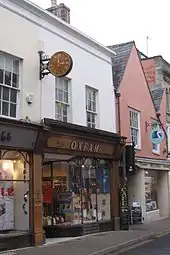
In 2010 Oxfam was criticized[83][84] for aggressively expanding its specialist bookshops, using tactics more often associated with multi-national corporations. The charity has been criticized as some claim this expansion has come at the expense of independent secondhand book sellers and other charity shops in many areas of the UK.
Dole Food Company
In May 2013 Oxfam demanded Dole remove its 'Ethical Choice' labels from its bananas in New Zealand until it improved treatment of its workers in the Philippines.[85]
2015 study on net worth inequality
Time Inc. Network wrote a reply to an Oxfam study from January 2015[86] on inequality stating that the richest 1% at the end of 2016 will own more than half of the world's assets. However, Time pointed out that the data were based on a study from Credit Suisse. In this study, The Global Wealth Databook 2015, personal assets were calculated in net worth, meaning wealth would be negated by having any mortgages.[87]
Staff sexual misconduct in Haiti and Chad
In February 2018 an investigation by The Times newspaper found that Oxfam allowed three men to resign and sacked four for gross misconduct after an inquiry concerning sexual exploitation, the downloading of pornography, bullying and intimidation. A 2011 confidential report by Oxfam had found "a culture of impunity" among some staff in Haiti and concluded that 'it cannot be ruled out that any of the prostitutes were under-aged'. Among the staff who were permitted to resign was the charity's Belgian country director, Roland Van Hauwermeiren.[88] In the internal report, Van Hauwermeiren admitted using prostitutes at a villa whose rent was paid for by Oxfam with charitable funds. Oxfam's chief executive at the time, Dame Barbara Stocking, offered Hauwermeiren "a phased and dignified exit" because sacking him risked "potentially serious implications" for the charity's work and reputation.[89]
Oxfam did not report any of the incidents to the Haitian authorities, because "it was extremely unlikely that any action would be taken".[89] Although Oxfam disclosed details of the incident to the Charity Commission, the Commission revealed after The Times investigation that it had never received Oxfam's final investigation report and Oxfam "did not detail the precise allegations, nor did it make any indication of potential sexual crimes involving minors". A spokesperson for the Commission commented that: "We will expect the charity to provide us with the assurance that it has learnt lessons from past incidents".[90] Oxfam later explained it had not given details to the Commission beyond "inappropriate sexual behaviour" because using prostitutes in Haiti was not illegal.[91]
In response to the revelations, Liz Truss, the chief secretary to the Treasury, described the reports as "shocking, sickening and depressing". Oxfam issued a statement in which it asserted "Oxfam treats any allegation of misconduct extremely seriously. As soon as we became aware of a range of allegations – including of sexual misconduct – in Haiti in 2011 we launched an internal investigation. The investigation was announced publicly and staff members were suspended pending the outcome". The statement also added that the allegations "that under-age girls may have been involved were not proven".[89] Speaking on the BBC's Andrew Marr Show, the international development secretary, Penny Mordaunt, said Oxfam had failed in its "moral leadership" over the "scandal". Mordaunt also said that Oxfam did "absolutely the wrong thing" by not reporting the detail of the allegations to the government.[92] The incident led the International Development Committee of the UK Parliament to issue a report about sexual harassment and abuse in the humanitarian sector on 31 July 2018.[93]
Oxfam had been aware that Van Hauwermeiren while director of Oxfam's relief operation in Chad in 2006 and other staff had repeatedly used prostitutes at the Oxfam team house there, and that one of Oxfam's staff members had been fired for his behaviour.[94][95] Oxfam's deputy chief executive Penny Lawrence resigned, taking full responsibility and acknowledging that "(c)oncerns were raised about the behaviour of staff in Chad as well as Haiti that we failed to adequately act upon".[95] New allegations were made by a senior staffer, Helen Evans, who had been the lead investigator of organizational sexual misconduct between 2012 and 2015.[96] A commentator in the medical journal Lancet argued the Oxfam sex scandal was not surprising.[97]
Efficiency and accountability
The Charity Navigator gave Oxfam America a three-star overall rating, a two-star financial rating and a four-star accountability and transparency rating for the 2019 fiscal year.[98]
Awards and nominations
In January 2013, Oxfam was nominated for the Charity of the Year award at the British Muslim Awards.[99]
See also
- 2007–08 world food price crisis
- Global Hunger Index
- Integrated Food Security Phase Classification
- Millennium Development Goals (Goal 1)
- Make Trade Fair
- Ox-Tales
- Universal Declaration on the Eradication of Hunger and Malnutrition (1974)
References
- ↑ "OXFAM - Charity 202918". register-of-charities.charitycommission.gov.uk.
- 1 2 "How we are organized". Retrieved 9 February 2020.
- ↑ "Oxfam Annual Report and Accounts, 2016/7" (PDF). 2017. p. 8.
- ↑ Black, (1992)
- ↑ "Oxfam shop founder dies aged 88". News. BBC News. 2 October 2007. Retrieved 26 February 2012.
- ↑ Smith, George (21 April 1998). "Harold Sumption (obituary)". The Independent.
- ↑ Pegram, Giles (22 February 2017). "Has fundraising moved forwards, or backwards, in the last 50 years? And where next?". 101 Fundraising. Retrieved 10 February 2022.
- ↑ "Stitching Oxfam International". Companies House.
- ↑ "Winnie Byanyima to serve second 5-year term leading Oxfam International, from Nairobi". Oxfam.org. 4 December 2017.
- ↑ "Open Sans". Archived from the original on 18 May 2015.
- ↑ "Aid agency Oxfam condemns Saudi airstrike in Yemen". Reuters. 20 April 2015.
- ↑ "Rapid response: Tackling cholera in Sierra Leone with Oxfam". Department for International Development. Retrieved 2 February 2015.
- ↑ "Rigged rules mean economic growth increasingly 'winner takes all' for rich elites all over world". Oxfam. 20 January 2014.
- ↑ Neuman, Scott (20 January 2014). "Oxfam: World's Richest 1 Percent Control Half of Global Wealth". NPR. Retrieved 25 January 2014.
- ↑ Stout, David (20 January 2014). "One Stat to Destroy Your Faith in Humanity: The World's 85 Richest People Own as Much as the 3.5 Billion Poorest". Time. Archived from the original on 23 January 2014. Retrieved 21 January 2014.
- ↑ Wearden, Graeme (20 January 2014). "Oxfam: 85 richest people as wealthy as poorest half of the world". The Guardian. Retrieved 21 January 2014.
- ↑ Kristof, Nicholas (22 July 2014). "An Idiot's Guide to Inequality". The New York Times. Retrieved 22 July 2014.
- ↑ Cohen, Patricia (19 January 2015). "Richest 1% Likely to Control Half of Global Wealth by 2016, Study Finds". The New York Times. Retrieved 19 January 2015.
- ↑ Ratcliff, Anna (16 January 2017). "Just 8 men own same wealth as half the world". Oxfam. Retrieved 16 January 2017.
- ↑ Mullany, Gerry (16 January 2017). "World's 8 Richest Have as Much Wealth as Bottom Half of Global Population". New York Times. Retrieved 16 January 2017.
- ↑ Elliott, Larry (16 January 2017). "World's eight richest people have same wealth as poorest 50%". The Guardian. Retrieved 16 January 2017.
- ↑ Hardoon, Deborah. "An Economy for the 99%: It's time to build a human economy that benefits everyone, not just the privileged few". oxfam.org.uk. Oxfam. Retrieved 16 January 2017.
- ↑ "Rigged Rules – Dumping". Archived from the original on 9 February 2006. Retrieved 29 January 2006.
- ↑ "Rigged Rules – Market Access". Archived from the original on 21 February 2006. Retrieved 29 January 2006.
- ↑ "Rigged Rules – Labour Rights". Archived from the original on 24 December 2005. Retrieved 29 January 2006.
- ↑ "Rigged Rules – Patents". Archived from the original on 22 March 2006. Retrieved 29 January 2006.
- ↑ "History of Oxfam". Oxfam.
- ↑ "Fair Trade Products, Homeware, Gifts & Jewellery from". Shop. AU: Oxfam. Retrieved 16 May 2012.
- ↑ Annual Report, Oxfam, November 2010
- ↑ "Trustee's Report 2007–08". UK: Oxfam. Archived from the original on 30 January 2009.
- ↑ "fines eleven more charities". ICO. 5 April 2017. Retrieved 13 November 2017.
- ↑ "Oxfam International Financial Statements 2019-20" (PDF). Oxfam International. Retrieved 2 January 2022.
- ↑ "Oxfam Japan closure". Oxfam International. October 2018. Retrieved 2 January 2022.
- ↑ "Stichting Oxfam International Rules of Procedure as amended on 4 October 2012" (PDF). Archived from the original (PDF) on 14 March 2016. Retrieved 20 January 2015.
- ↑ "Wealth: Having It All and Wanting More" (PDF). Oxfam. January 2015. pp. 1–12. Retrieved 20 January 2015.
- ↑ "Privacy Notice". Oxfam International. 17 October 2019. Retrieved 1 February 2021.
- ↑ Fallon, Joan (21 November 2016). "Ray Offenheiser to join Notre Dame faculty as Distinguished Professor of the Practice in the Keough School of Global Affairs". University of Notre Dame. Retrieved 21 September 2017.
- ↑ "Abby Maxman". Oxfam America. oxfamamerica.org. Retrieved 21 September 2017.
- ↑ Maxman, Abby (5 July 2017). "Aid to Africa" (letter to the editor). New York Times. nytimes.com. Retrieved 21 September 2017.
- ↑ Blackburn, (1993)
- 1 2 "Historien kort" (in Danish). Oxfam IBIS.
- 1 2 "IBIS hedder nu Oxfam IBIS" (in Danish). Globalnyt.
- 1 2 "Ibis om Oxfam-medlemskab: Vi kommer ikke til at druknet" (in Danish). altinget.dk.
- 1 2 "Vejen til medlemskab af Oxfam" (in Danish). Oxfam IBIS.
- ↑ "Archived copy". Archived from the original on 16 November 2015. Retrieved 22 March 2016.
{{cite web}}: CS1 maint: archived copy as title (link) - ↑ Oxfam GB Annual Report 2017, pp. 31, 54.
- ↑ Elgot, Jessica (11 February 2018). "Oxfam told to show 'moral leadership' or lose government funds". The Guardian.
- ↑ "Reality Check: How much UK charity money goes to Oxfam?". BBC News. 12 February 2018.
- ↑ "Oxfam's CEO, Directors and Trustees". Oxfam.org.uk.
- ↑ Brexit and the refugee crisis (PDF). Oxfam GB. 2017. p. 6.
- ↑ The Oxfam Story, page 11, Pergamon Press Ltd (1964) Library of Congress Card No. 64-17726
- ↑ Black 1992.
- 1 2 Drops in the ocean: the work of Oxfam 1960–1970. London: Macdonald & Co. 1970. ISBN 0-356-03568-9.
- ↑ "About". IN: Oxfam.
- ↑ "Oxfam India says it's 'severely' hit by ban on foreign funds". BBC News. 3 January 2022. Retrieved 4 January 2022.
- ↑ "Home". Oxfam NZ.
- ↑ "Oxfam Trailwalker in New Zealand". www.runningcalendar.co.nz. Retrieved 13 November 2015.
- ↑ "Improving disaster relief in the Pacific with Oxfam New Zealand | Deloitte New Zealand | Corporate responsibility". Deloitte New Zealand. Archived from the original on 17 November 2015. Retrieved 13 November 2015.
- ↑ "Who we are – about our people". Oxfam New Zealand. 13 June 2012. Retrieved 13 November 2015.
- ↑ Rudi Roth (2012). UNIA et l'antisémitisme en Belgique: «stop ou encore» ?.
- ↑ "NGOs and Antisemitism: Oxfams "Blood Oranges", Christian Aids "Bethlehems Child", and HRWs "Indiscriminate killings" » ngomonitor". www.ngo-monitor.org. 27 January 2007. Retrieved 17 July 2020.
- ↑ Lazaroff, Tovah; Lappin, Yaakov (31 October 2009). "NGO: Oxfam aids illegal Palestinian deeds". The Jerusalem Post. Retrieved 30 March 2015.
- 1 2 "Oxfam agrees to conditions on Israel set by UK Jewry". The Times of Israel. Retrieved 2 February 2015.
- ↑ "Israeli settlements 'jeopardising' Palestinian prosperity". BBC News. Retrieved 2 February 2015.
- ↑ Bloodworth, James (15 January 2014). "Left Foot Forward forces Oxfam climbdown over speaker's homophobic comments". Left Foot Forward. Retrieved 16 January 2014.
- ↑ "Scarlett Johansson quits Oxfam role over SodaStream row". BBC News. 30 January 2014. Retrieved 30 January 2014.
- ↑ L'Echo (31 December 2019). "De l'argent belge géré en Palestine par des terroristes présumés".
- ↑ "Oxfam removes antisemitic books from sale after Israel's UK ambassador tweets condemnation". 13 March 2020. Archived from the original on 12 January 2022.
- ↑ "Trump admin considers branding human rights groups as "anti-Semitic"". NBC News. Retrieved 1 February 2021.
- ↑ "The Big Charity Bonanza". New Internationalist (keynote). 1 October 2005.
- ↑ "The New Scramble for Africa", Red Pepper, July 2005
- ↑ Quarmby, Katherine (30 May 2005), "How Oxfam is Failing Africa", New Statesman
- ↑ Rothmyer, Karen (March–April 2011). "Hiding the Real Africa; Why NGOs Prefer Bad News". Columbia Journalism Review.
- ↑ Omaar; de Waal (1997). Food and Power in the Sudan: A Critique of Humanitarianism. African Rights. ISBN 978-1-899477-13-5.
- ↑ The Joint Evaluation of Emergency Operations in Rwanda, OECD, 1994
- 1 2 "Starbucks in Ethiopia coffee row". BBC News. UK. 26 October 2006. Retrieved 2 November 2009.
- ↑ "Oxfam versus Starbucks: And this time, Oxfam may be wrong". The Economist. 7 November 2006. Retrieved 2 November 2009. (subscription required)
- ↑ Craig Harris (28 November 2007). "Starbucks chairman, Ethiopia talk beans". Seattle PI. Retrieved 20 March 2015.
- ↑ Overington, Caroline (28 April 2007). "Oxfam coffee 'harms' poor farmers". The Australian. News Limited. Retrieved 15 September 2010.
- ↑ Xuereb, Mario (28 June 2007). "Not free, but fair: Oxfam cleared of coffee chicanery". The Age. Melbourne. Retrieved 2 November 2009.
- ↑ Duncan Green (10 December 2009). "Blaming the victims: Does climate change require women in poor countries to stop 'popping them out'?". New Statesman. Retrieved 30 March 2015.
- ↑ "Development lobby "disgrace" on population" (Press release). Optimum population. 9 December 2009. Archived from the original on 9 July 2010.
- ↑ Victoria Gallagher (10 February 2010). "Indie booksellers concerned by latest Oxfam Bookshop". The Bookseller. Retrieved 30 March 2015.
- ↑ Hill, Susan. "Bullying is bullying – whoever does it". The Spectator. UK. Archived from the original on 14 February 2010.
- ↑ "Dole bananas not ethical – Oxfam". 3 News. 28 May 2013. Archived from the original on 21 February 2014. Retrieved 28 May 2013.
- ↑ "Richest 1% will own more than all the rest by 2016 – Oxfam International". Oxfam. 19 January 2015.
- ↑ "Yes, Oxfam, the Richest 1% Have Most of the Wealth. But That Means Less Than You Think". Time. Archived from the original on 21 January 2015.
- ↑ "Oxfam Haiti allegations: How the scandal unfolded". BBC News. 21 February 2018. Retrieved 21 March 2018.
Among the male staff accused of sexual misconduct is Oxfam's then-director of operations in Haiti, Roland Van Hauwermeiren. He is alleged to have used prostitutes at a villa rented for him by the charity.
- 1 2 3 Chief Reporter, Sean O’Neill (9 February 2018). "Minister orders Oxfam to hand over files on Haiti prostitute scandal". The Times. ISSN 0140-0460. Retrieved 9 February 2018.
- ↑ "Oxfam denies 'Haiti prostitute' cover-up". BBC News. 9 February 2018. Retrieved 9 February 2018.
- ↑ Hope, Christopher (4 July 2018). "Oxfam did not tell regulator about use of prostitutes in Haiti because it was not illegal, says Barbara Stocking". The Daily Telegraph. Archived from the original on 12 January 2022. Retrieved 5 July 2018.
- ↑ "Oxfam 'failed in moral leadership'". BBC News. 11 February 2018. Retrieved 11 February 2018.
- ↑ "Sexual exploitation and abuse in the aid sector - International Development Committee - House of Commons". publications.parliament.uk. Retrieved 5 March 2021.
- ↑ Ratcliffe, Rebecca; Quinn, Ben (11 February 2018). "Oxfam: fresh claims that staff used prostitutes in Chad". The Observer.
- 1 2 "Oxfam: Deputy resigns over sex claims amid crisis talks". BBC News. 12 February 2018.
- ↑ Smout, Alistair. (13 February 2018). "UK's Oxfam hit by new report of sex abuse by aid workers". Reuters website Retrieved 13 February 2018.
- ↑ Mishal S Khan. sex scandal or governance failure? The Lancet. 23 February 2018
- ↑ Oxfam America - Charity Navigator
- ↑ "Winners honoured at British Muslim Awards". Asian Image. 31 January 2013. Retrieved 1 November 2015.
Further reading
- Berry, Craig, and Clive Gabay. "Transnational political action and 'global civil society' in practice: the case of Oxfam." Global Networks 9.3 (2009): 339–358. [ online]
- Black, Maggie (1992). A Cause for Our Times: Oxfam the First 50 Years. Oxford UP. ISBN 0-85598-173-3..
- Blackburn, Susan (1993). Practical Visionaries: A Study of Community Aid Abroad. Melbourne University Press. ISBN 0-522-84562-2..
- Crewe, Emma. "Flagships and tumbleweed: A history of the politics of gender justice work in Oxfam GB 1986–2015." Progress in Development Studies 18.2 (2018): 110–125.
- Eadie, Deborah and Suzanne Williams, ed. The Oxfam Handbook of Development and Relief (2 vol. 1995).
- Gill, Peter. Drops in the ocean: the work of Oxfam 1960–1970 (1970).
- Hajnal, Peter I. "Oxfam International". in Peter I. Hajnal, ed. Civil society in the information age (Routledge, 2018). 57–66.
- Hilton, Matthew. "Oxfam and the Problem of NGO Aid Appraisal in the 1960s". Humanity: An International Journal of Human Rights, Humanitarianism, and Development 9.1 (2018): 1–18. abstract
Archival sources
- Oxfam Canada fonds at Library and Archives Canada. Archival reference number, R2972. Former archival reference number, MG28-I270. Date range: 1958–1985. Extent: 17.855 meters of textual records; 873 photographs; 1 audio disc; 14 blueprints & maps.
- "Finding aid to the Oxfam Canada fonds at Library and Archives Canada" (PDF). Retrieved 18 June 2020.
- "Oxfam Canada fond description at Library and Archives Canada". Retrieved 18 June 2020.
External links
 Media related to Oxfam at Wikimedia Commons
Media related to Oxfam at Wikimedia Commons- Official website